All the deep philosophical questions, starts the joke, were asked by the classical Greeks, and everything since then has been footnotes and comments in the margins, finishes the punchline.



All the deep philosophical questions, starts the joke, were asked by the classical Greeks, and everything since then has been footnotes and comments in the margins, finishes the punchline.

This Anniversary Year provides a reason to reflect on the fact that many members have been involved with the IEEE Society on Social Implications of Technology (SSIT) throughout their full professional careers.
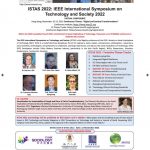
“Digital and Societal Transformations” – Conference website here: https://www.istas22.org/
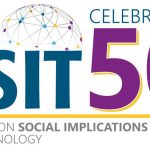
This year, 2022, marks 50 years of history within IEEE for the Society on Social Implications of Technology. It is a moment to reflect on what has transpired in the realm of technology and society over this time, and on the accomplishments of SSIT and its members in helping to guide technological development in directions that benefit humanity. It is also a moment to look forward and imagine what the next 50 years will bring. What should SSIT be doing now to prepare for that future? We welcome participation by everyone who has an interest or stake in issues related to technology and society – which is all of us.

If caregiving is the very essence of being human, why would we consider turning it over to robots? Technology—and artificial intelligence (AI, in particular—have created a world in which automation is prioritized and digital is seen as an improvement on analog—more accurate, more portable, and more controllable. Caregiving is as analog as it gets and it is a field with a serious labor shortage. That makes it ripe for automation—and in fact, the robot caregivers are already here.
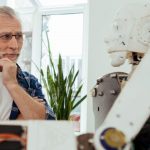
Social robotics is poised to impact society by addressing isolation and providing companionship by augmenting human interaction when none is available.

Worldwide, there are 55 million individuals living with dementia and it is projected that by 2050, this number will increase to 139 million. Technological devices and solutions that can benefit the dementia community also carry ethical implications such as privacy and issues of consent. AI-driven LBS solutions may exacerbate the marginalization of individuals living with dementia.

In the first six months of 2018, eight New York City yellow cab drivers, impacted by big tech disruption on the taxi industry, took their own lives. “I am not a Slave and I refuse to be one,” wrote one in his suicide note.

Having a philosophical road map to what is required, might help those with skills to design intelligent machines that will enable and indeed promote human flourishing.

The term “modern indentured servitude” did not originate with this workshop, but we hope that this special issue has highlighted many of the different shapes and processes it can take, some more insidious than others. We would like to think that, if each paper could talk, they would get up one after the other and say, “No, I’m Spartacus.” In these dark times, each of us needs the courage to be Spartacus.

Where do historical debates take us? Their political and economic contexts are similar to ours, and even the list of technological issues is familiar. Many decades later, institutions still feel shaky, economies remain inequitable, geopolitics are increasingly multipolar, and societies are riven by technological change.
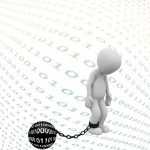
It would be good if whenever a client connected to an http server, or indeed any app connected with a central server, the server responded with a corresponding acknowledgment of data, along the lines of “Before we begin our session this morning, I would like to acknowledge the traditional owner of the data which is being transferred, and respect rights to privacy, identity, location, attention and personhood.”
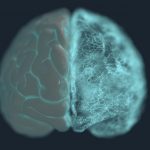
One can see the emergence of ever more efficient forms of intelligence as networked self-similar patterns that are embedded in the universe at its core, driven as they are by the sustained maximization of entropy as a causal force. As a maximizer of future freedom of action, the very existence of gravity can be viewed as a form of embedded, purposeful, goal-directed form of intelligence.
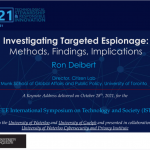
Ron Deibert presented “Investigating Targeted Espionage: Methods, Findings, Implications” as a Keynote during IEEE International Symposium on Technology and Society… Read More

The volume under review is a selection of declassified FBI documents, reproduced in facsimile, from the Cold War era files of 16 people (15 men and one woman) described as scientists.
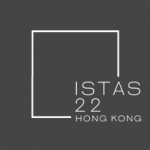
VIRTUAL CONFERENCE – Hong Kong, November 10-12, 2022 Conference Theme: “Digital and Societal Transformations” – Conference website: https://www.istas22.org

The book documents Limbaugh’s formative role in turning an old technology into an instrument of power that transformed the Republican Party and political discourse in the United States. The talk-radio host proved to be a success as both a propagandist and a ratings builder. Station owners were quick to join his syndicated network and to hire personalities who combined Limbaugh’s smooth delivery, ability to empathize with his audience, biting humor, and relentless attack on all things liberal—real or imagined. Profit mattered but winning the “culture war” counted for as much if not more than Rosenwald cares to consider.

Jeffrey (Jeff) Robbins, a dedicated SSIT member, author, and ISTAS presenter for over forty years, died April 18, 2022. “He added so much to SSIT over many years, with much humor and good will.”

When faced with an ethical problem such as a conflict of interest in which codes of ethics or available ethical problem-solving methods cannot help us decide upon the moral course of action to take. A method claimed to be helpful in such situations is The New York Times Test.

Emerging social contexts add new requirements to the knowledge that successful roboticists need. Much of this additional knowledge comes from the social sciences and humanities.